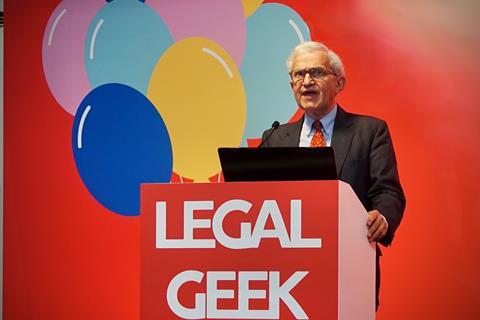Lawmakers’ attempts to ensure that humans always have oversight over decisions made by artificial intelligence are doomed, the master of the rolls said today. Sir Geoffrey Vos told the ninth ‘Legal Geek’ lawetch networking event in London that technological developments would rapidly outpace legislation such as the EU's new Artificial Intelligence Act.
Such AI tools will be able to advise on and resolve some legal questions as well as humans do - but far more quickly and far more cheaply, he said. 'Whilst lawyers and judges will want to retain complete human oversight of the use of these technologies, they will, I suspect, not actually be able, without spending masses of time and money, to check the work of the AI.'
This problem requires urgent attention, he said. 'Even if it is illegal (as, for example, under the AI Act) for machines to decide certain questions, the humans, who are legally accountable, may be left with no economic choice but to accept the AI’s work product.'
'Once the human lawyer or judge is faced with something that may take days to check – or simply be uncheckable – what choice do they have but to accept the advice or verdict of the machine.'

Read more
Sir Geoffrey's speech, entitled The Digital Trading Revolution: Underpinned by Law, also noted that progress towards paperless trade and commerce 'has taken longer than many people hoped and even expected'.
While the UK Jurisdiction Taskforce has clarified the position of digital property in English law, a global breakthrough will be needed before the wholesale adoption of digital trade and the abandonment of paper documents of title, he said.
'What is needed is for all the private law systems in mainstream international commercial use, in addition to English law, to take similar steps forward and develop their private laws in complementary ways that allow for the paperless transfer of digital assets, digital money and physical goods,' he said.
Pointing out that 'tech and the law need to be seen together and work together' he concluded wtih a rallying call: 'You lawyers will need to make sure that regulation supports rather than hampers innovation.'
This article is now closed for comment.






























8 Readers' comments